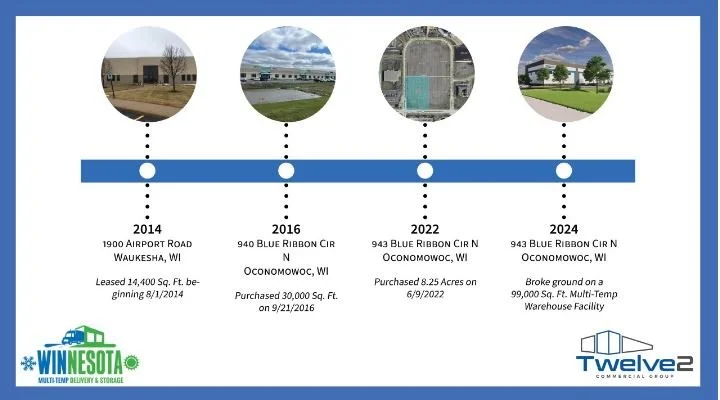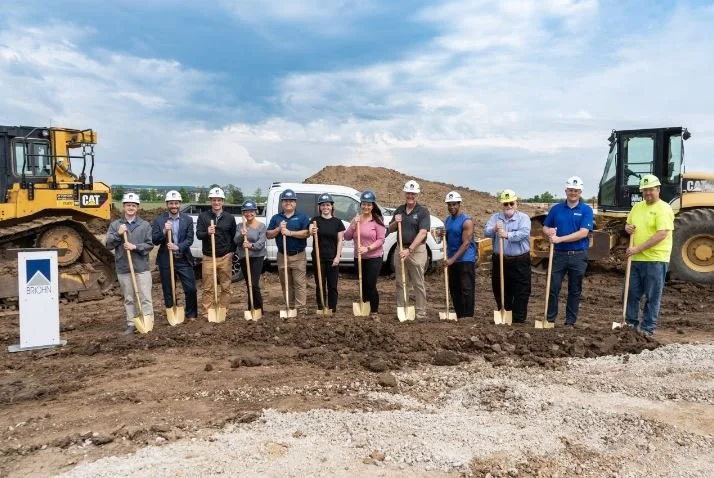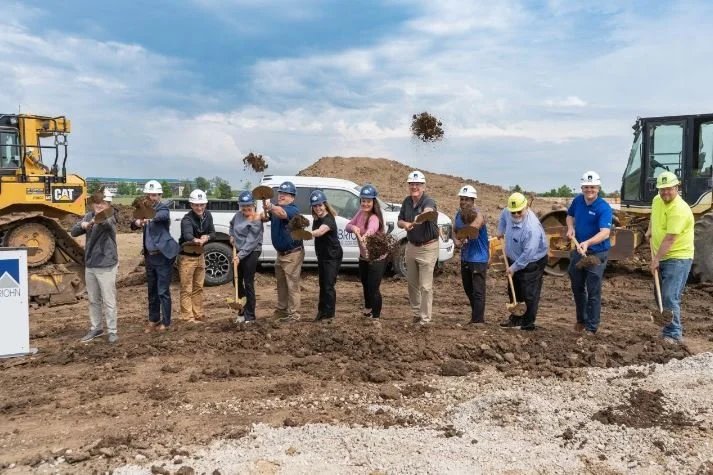
NEWS
Twelve2 Commercial Group Quarterly Business Update
Getting the job done for our clients.
In Q2 of 2024 Twelve2 Commercial Group completed 18 Industrial transactions for our clients.
5 Industrial Sold transactions for over $9.7 million in sales.
Those transactions totaled over 170, 000 square feet with an average sale price of almost $84/SF.
A highlight of the sold transactions in Q2 was the building located at 10920 Lincoln Avenue in West Allis. The 109,372 SF building was purchased by the West Allis Commerce Center LLC and White Box Renovations commenced immediately to devise the space into a multi-tenant warehouse/flex unit building. Additional information on the West Allis Commerce Center can be found by clicking below.
On the leasing side, 13 separate leases/renewals on over 140,000 square feet.
The average lease rate on these transactions was just over $8/SF.
Those leases amounted to Gross Volume in excess of $4 million.
The largest of those lease transactions was a 39,594 square foot building located at 13505 Louis Sorenson Road in Mount Pleasant. We were able to secure a favorable lease rate for our client as well as negotiate Landlord improvements to the space prior to occupancy.
Twelve2 Commercial Group & Winnesota, 10 Years of Growth
Nothing #Cooler in this industry than seeing one of your #Coolest clients grow over the course of a decade!
Congratulations to Winnesota Multi-Temp Delivery and Storage on last week’s groundbreaking. Coming soon to Oconomowoc, WI is Winnesota’s 100,000 square foot Multi-Temp Warehouse Facility!
Beginning in 2014, Zach Noble and Twelve2 Commercial Group have used their market expertise to assist Winnesota in discovering locations that are a perfect fit for their Cold Chain Logistics and Warehousing business. Hard to believe it all started with a satellite warehouse….but TEN years, FOUR deals and ONE lifelong relationship later, I couldn’t be more proud of Nick Olsen and the entire team at Winnesota. Throughout our time working together, you’ve made me feel like an extension of the Winnesota family and I can’t wait to see what the next ten years brings!
A special thank you to Joe Jursenas, Peyton Paquin, and the entire team at Briohn Building for turning this dream into a reality!
Learn more about Winnesota and how they can freeze your logistics worries away www.winnesota.com/
Twelve2 reached out to Nick Olsen of Winnesota for a comment on their experience working with Zach Noble ~
"Zach took care of us from day one. He helped us strategize our real estate needs, instrumental in our companies growth plans. Z-man is a friend, confidant and professional in every way! Thank you for everything Zach! You are truly the best!" ~ Nick Olsen; President, Winnesota.
Breaking ground at 943 Blue Ribbon Circle N, Oconomowoc, WI.
Photo courtesy of Briohn Building Corporation.
Southeastern Wisconsin industrial real estate market softens in Q1
Waukesha County remains a hot market for industrial real estate, particularly Pewaukee and New Berlin.
BizTimes
Milwaukee Business News
Apr 18, 2024 12:41 pm
The southeastern Wisconsin industrial real estate market showed signs of softening during the first quarter of the year, according to the latest market report from the Commercial Association of Realtors Wisconsin (CARW) and REDIComps.
The region’s industrial real estate market had a vacancy rate of 5.8% during the first quarter, which is up from 5.4% in the fourth quarter of 2023 and up from 3.6% a year ago.
The region’s industrial market had negative absorption of 153,869 square feet of space during the first quarter of this year, a significant decline from positive absorption of 712,000 square feet of space during the first quarter of 2023.
There is currently more than 3 million square feet of industrial space under construction in the region, including 1.45 million square feet in the Kenosha area, according to the report.
In a recent post on LinkedIn, Jeff Hoffman, an industrial real estate broker and principal with Cushman & Wakefield | The Boerke Company, said there is currently no industrial space under construction in the region on speculation, which had been commonplace in southeastern Wisconsin for years.
“While overall market activity has been strong for much of the past year, deal velocity has not followed,” Hoffman wrote on LinkedIn. “However, deals are happening again and the 20,000 to 60,000-square-foot size frame has provided key support to the market. The 100,000 to 150,000-square-foot range is also starting to awaken with three recent transactions occurring in the Kenosha submarket.”
Hoffman said Waukesha County remains a hot market for industrial real estate, particularly Pewaukee and New Berlin. He said Chicago-based HSA Commercial Real Estate plans to build a 226,800-square-foot spec industrial building on a site it recently acquired at Pabst Farms in Oconomowoc.
Large industrial spaces in the I-94 North-South corridor have lost momentum, Hoffman said in the LinkedIn post.
“The woes of Racine and Kenosha County continue for vacancies above 150,000 square feet,” he wrote. “Given the surge of bulk deliveries over the past 18 months, Class A vacancies across Racine and Kenosha have spiked to 25%.”
However, Kenosha County had the highest amount industrial space absorption in the region during the first quarter at 337,500 square feet, largely as a result of Haribo leasing 447,000 square feet while vacating 157,600 square feet in another building, according to the CARW and REDIComps report.
Milwaukee County had negative absorption of 965,000 square feet of industrial space during the first quarter, the most in the region, largely as a result of Briggs & Stratton vacating 566,700 square feet, according to the report.
Brookfield's Barnwell Travels 7,100 Miles To Visit a Warehouse Like No Other She's Seen
Located About 25 Miles From Seoul, South Korea, Six-Story Wonchang Logistics Center Has 4.6 Million Square Feet of Space
By Tony Wilbert | CoStar News | August 3, 2022 | 9:46 AM
Brookfield Properties' Devin Barnwell recently got out of her Atlanta office — in a big way.
Barnwell, who serves as global logistics portfolio manager at Brookfield Asset Management, traveled more than 7,100 miles to tour a six-story warehouse under construction in South Korea. Barnwell spent a week in the country with Brookfield’s logistics team and leadership including Stuart Mercier, head of Asia, and Korean head Wonbin Suh and portfolio manager Joohyoun "Jay" Park checking out developments and markets and opportunities.
While multistory industrial buildings are gaining popularity in the United States, the one she toured blew her away.
"I am at a loss of words to accurately convey the size and scale" of an approximately 4.6 million-square-foot, six-story warehouse, Barnwell said in a LinkedIn post. "It’s like nothing I have seen in the U.S. or elsewhere!"
The project, called Wonchang Logistics Center, is about 20 miles from Incheon International Airport and approximately 25 miles from the city center of Seoul, the capital. Brookfield has agreed to purchase the property and is talking with potential tenants. The center which would top a five-story, 4 million-plus-square-foot behemoth that warehouse giant Prologis is constructing in Ontario, Calif.
Back in Atlanta, Barnwell soon might be heading to another part of the world as Brookfield expands: "Our largest development pipeline by far is the US, but we are active developers in Brazil, China, Japan [and] several European countries, and soon Australia in addition to Korea," she wrote in a message on LinkedIn.
Congress Edges Forward on CHIPS Act, Bill Seen Boosting US Semiconductor Output and Development
Long-Delayed Measure Comes During Shortage of Chips Used in Electronics, Cellphones and Computers…
By Parimal M. Rohit and Richard Lawson | CoStar News | July 26, 2022 | 5:15 P.M.
Congress is moving forward on legislation designed to boost domestic manufacturing of semiconductors, an initiative that's seen as encouraging more companies to build or expand multibillion-dollar chipmaking plants in the United States.
The Senate voted Tuesday to advance a long-delayed bill that would provide $52 billion in federal subsidies for domestic semiconductor research, design, and manufacturing through the CHIPS Act. It comes as the world is dealing with a shortage of semiconductor chips used in electronics such as automobiles, cellphones, computers and dishwashers.
The Senate is expected to pass the final version of the legislation in the next day or two and then it would head to the House, where it is expected to pass before making its way to President Biden’s desk to be signed into law, said Dan Rosso, a spokesman for the Semiconductor Industry Association, in an email. The signing would mark more than a year of debate over different versions of the bipartisan legislation as some semiconductor companies are waiting to act.
Intel Corp., a Fortune 500 company based in Santa Clara, California, canceled plans for the official groundbreaking of two chip plants outside Columbus, Ohio, last week in protest over slow congressional movement on the legislation. Intel plans to spend at least $20 billion on the plants in the largest private investment in Ohio's history, but that investment could climb to $100 billion if Congress passes the legislation.
"Intel has been clear since its announcement that the speed of the initial phase of construction and the overall size and scope of their investment in Ohio are dependent on the CHIPS Act, which has strong support from Ohio's bipartisan congressional delegation,” JobsOhio, the state’s private economic development corporation, said in an emailed statement. “We are looking forward to the expedient passage of CHIPS Act funding to continue the momentum of this historic investment in Ohio."
Pressure is also coming from Texas, where companies such as South Korea-based Samsung Electronics and Texas Instruments announced plans for at least $47 billion of investments in their separate semiconductor operations last year, according to Gov. Greg Abbott.
"This legislation will assist the United States in cementing a secure semiconductor supply chain, which is vital to our nation’s economy and national security, and better equip Texas to compete for investment in this industry,” Abbott said in a statement.
Corporate Investment
Samsung picked Taylor, Texas, a small town north of Austin, last year as the site to build a $17 billion semiconductor plant. Since then, Samsung filed paperwork with the state to build an additional 11 fabrication plants in Central Texas — an investment valued at up to $192 billion — over the next 20 years. But that investment largely hinges on the passage of the CHIPS Act, according to Abbott.
However, the bipartisan CHIPS Act faces some opposition, and there are no guarantees further delays won't crop up.
Sen. Bernie Sanders from Vermont voted against advancing the CHIPS Act on Tuesday. Sanders, in a prepared statement issued last week, called the CHIPS Act “corporate welfare" and said it would add at least $76 billion to the national deficit. He urged Biden and his congressional colleagues to avoid giving chipmaking corporations a “blank check” at taxpayer expense.
Sanders said he supports efforts to expand U.S. microchip production to help with the global chip shortage that "is costing American workers good jobs and raising prices for families." But he doesn't think American taxpayers should be footing the bill when semiconductor companies are making tens of billions of dollars in profits and paying their executives "exorbitant compensation packages," according to the statement.
The editorial board of the Wall Street Journal also opposed the CHIPS Act, stating the U.S. semiconductor industry doesn’t trail China in several factors and isn’t in need of $52 billion of incentives.
“Seven of the world’s 10 largest semiconductor companies are based" in the United States and China trails American companies by years when it comes to semiconductor technology, the board stated in an op-ed last week.
In addition, some companies are already investing billions of dollars in U.S. semiconductor plants, eliminating any urgency in the need for government subsidies, the editorial board said. For example, Taiwan Semiconductor Manufacturing Co. broke ground on a $12 billion semiconductor plant in Arizona last year, and Intel started construction on two factories valued at $20 billion last year in Arizona.
Biden, meanwhile, virtually met with members of his administration and representatives from the semiconductor industry about the CHIPS Act Monday, according to administration officials.
“This CHIPS bill is an important piece of it to be able to stay in the game and be the most competitive nation in the world. That’s what we have to reestablish,” Biden said during the virtual meeting, according to a transcript. “We still are in a lot of places, but we got to do it here.”
The president added he hoped to sign the bill into law as soon as possible.
“This bill is going to supercharge our efforts to make semiconductors — those tiny chips the size of a fingerprint, which is — you know, some are large, but the size of a fingerprint — that power our everyday lives in America,” Biden said, according to the transcript.









